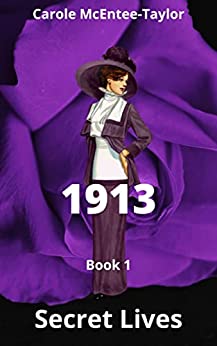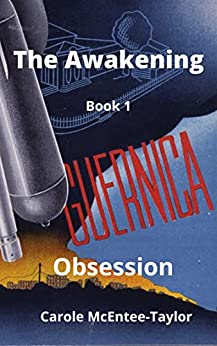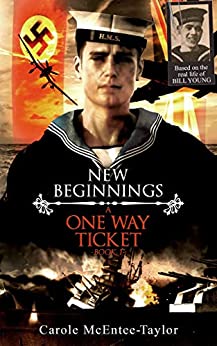Writers Inspiring Change feature author: Carole McEntee-Taylor
- IWIC Admin

- Jan 30, 2023
- 5 min read
Updated: Feb 17, 2023

IWIC: Tell us about yourself.
Carole: I live in North Lincolnshire with my husband David now but was born in Hadleigh, Essex. My parents both loved books, my father read detective, adventure and espionage stories while my mother read historical fiction and romance, so I grew up with a passion for reading most genres and this is reflected in my novels, which although set in the 20th Century are a mixture of all these.
IWIC: What inspired you to write? Carole: I write both military history and historical fiction and the inspiration behind my writing was my father in law, Ted Taylor. The BBC were doing a memories project back in 2005 and my husband suggested I write up his father’s war story. Ted was conscripted into the Rifle Brigade in September 1939 and fought in the Defence of Calais in May 1940 after which he spent five years as a POW. He never spoke about it but we managed to persuade him to talk on tape and received a very sanitized version of the fighting and his subsequent years in a POW camp. There was a word limit so I wrote it up as a short story. Ted was delighted with it and showed it to all his friends and we sent it off to the BBC and that was it until 2009. In 2008 Ted suffered a crippling stroke and ended up in a nursing home. To cheer him up I suggested writing up his war experiences in book form. This was quite daunting as I had no background in military history. So I began the long process of reading everything I could about the Defence of Calais, which wasn’t much. I found the battle was totally eclipsed by the evacuation from Dunkirk and was rarely mentioned, even on the most recent documentaries. This made me more, not less determined and I contacted the Regimental museum at Winchester who were really helpful and Dave and I went down and spent a day trawling through the small amount of archive material they had, first-hand accounts that weren’t public, that kind of thing. I made notes and slowly began to understand how the battle unfolded. From these records and the little Ted had told us I was able to identify where his company was and the fighting he took part in. Most of his company had been wiped out which was why details were so sketchy. He was one of very few survivors. I wrote up the information as I found it and it began to take shape.I knew even less about the treatment of the ordinary POW at the hands of their captors or their lives, having grown up on a diet of sanitized POW camp films and even one comedy set in a Stalag, (Stalag 13 I think) none of which bore any reality to the truth. My library began to grow and I spent most of my time when I wasn’t working, with my head buried in a book, pen and notepad on my lap either deciphering dry regimental war diaries or reading the few personal accounts of POWs who had been captured at Calais or in the surrounding areas. Like most authors I struggled to find a publisher but eventually, after writing a book about Herbert Columbine VC, Ted’s story, Surviving the Nazi Onslaught, was published by Pen & Sword Books Ltd. I was now hooked on writing military history and have written several other books, but I also wanted to write fiction because I couldn’t find anything I wanted to read. I have always been a voracious reader. I’d save up my pocket money as a six and seven year old and buy Enid Blyton books amongst others, disappear up into my bedroom and not come down again until they were finished. My Dad always used to say they were a waste of money because I could get through two or three books in a weekend but they weren’t. They were my escape from reality and the more I read the more it fueled my imagination. As I grew older I read anything I could get my hands on, crime, thrillers, historical fiction, occasionally romance and science fiction and of course chic lit! I liked big books I could lose myself in, probably to escape my disastrous relationships. Having finally extradited myself from the last one two years later I met David. I no longer needed to escape my reality so I stopped reading. I found books by authors I’d always loved no longer held my attention so I decided to write something I wanted to read and I had the perfect idea. Whilst writing Ted’s story I learnt that Brenda, my mother in law, had been a nurse throughout the London Blitz, and she and Ted were engaged when he went to war. Five long years later he came home and they were married. Their story fascinated me. They did not have the benefit of hindsight. Brenda waited even though she had no idea how long it would be or even if Ted would ever come home. Ted had somehow held onto the belief that he would come home even though he had no idea how long that might be. I decided to write up Ted and Brenda’s story as a docudrama, including an element of fiction to cover something Ted did in France. Can’t tell you what or it will spoil the story! Because their story was originally written as a docudrama there was a lot of fact in the original which I had to fictionalize. This turned out to be much harder work than I anticipated! I finally decided that it was impossible to fictionalize my in-laws because they were real people. I couldn’t have them doing things that weren’t in character and I didn’t really want to alienate the family and have my husband not talking to me because I had made his mum do something she wouldn’t have! So I changed their names and although the story is inspired by them and based on something that did happen, all the characters are now 100% fictional. Lives Apart: A WW2 Chronicle is in five books and is available on Kindle (Five books for under £5) or in paperback.
IWIC: What do readers like about your books? Carole: Rather than tell you what I think my readers like about my books this is one of my reviews on my latest five part saga Obsession: “Oh wow, I just love these books and this my favourite author, I just can’t get enough of books like this and really can’t wait for the third book to come out, do we have a date for it yet? If you love WW2 stories you’re going to love Carole McEntee-Tayor, I just love the way you write Carole, no long boring chapters just excitement and page turners.
IWIC: Is there a message in your books – some inspiration? Carole: I was going to answer no but actually I suppose there is. Although the novels are fiction the history they cover is factually correct. I’ve tried to cover the lesser known battles and stories of World War 2 so that those elements are not forgotten. I also feel very strongly that history is important so we can learn from it and not keep repeating the same mistakes. The novels all cover various aspects of the Holocaust which is something that should never be allowed to happen again. Unfortunately it has and is happening on a daily basis.
IWIC: Tell us about your book. Carole: The book I am showcasing here is a stand alone novel called “Betrayed“. I’d always wanted to write a novel about life in Nazi Germany and I always fancied the idea of writing about a serial killer. So I combined the two and Betrayed was the result. It was while I was writing Betrayed that I changed my writing style so although it was published after Lives Apart, Betrayed was really the beginning of my career as a fiction author.




















Comments